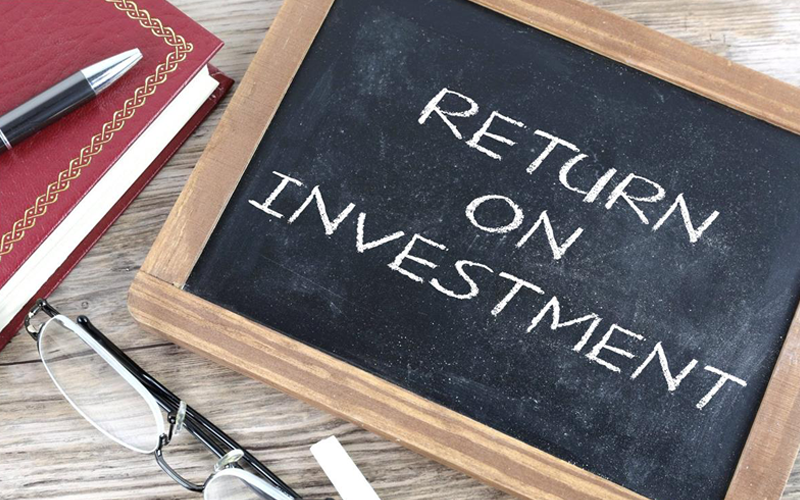
What is Return on Investment and Why is it Important?
Return on Investment (ROI) refers to the profit made on an investment in a given duration of time. It helps the investors in determining if investing in a security/property will be a wise choice or not. ROI shows the productivity of the investment made. It is crucial for an investor to have knowledge about ROI when investing in any kind of property/security. Before investing in a property, you must evaluate your rental income, costs and expenses. After narrowing it down, you must make sure that your expenses must not exceed your rental income.
Sometimes calculating the ROI of a residential property can be tricky due to ease of manipulation. Some factors may be included or excluded while calculating and it can become challenging when an investor has a choice of financing it or paying cash upfront.
In order to calculate gain on an investment, take the total return on investment and subtract the original investment. To calculate the ROI, you will take net gain on the investment and divide it by the original cost.
ROI = (Gain on Investment- Cost of Investment) / Cost of Investment
For example, you buy XYZ stock for $2,000 and sell it after 3 years for $3,000, the profit is $1,000 with a 50% Return on Investment.
Formula and Calculation of ROI on a Rental Property
ROI when Property is Bought for Cash:
Calculation of ROI on buying a property with cash is simple. For instance,
- You buy a rental property for $300,000 in cash.
- Closing cost is around $2000 and remodeling costs you another $18,000. Total cost of the property comes to $320,000.
- Rent collected every month is $4000
1 year later,
- Total rent income earned in 12 months is $48,000.
- Expenses like taxes, insurance, water bills sum up to $3,000 per annum.
- Annual return comes to $44,000.
ROI of the property:
- Annual return divided by total investment.
ROI= $44,000 ÷ $320,000 = 0.1375 or 13.75%
- Your ROI is 13.75%
ROI When Property is Financed:
Calculation of ROI for a property financed from a bank can be a little complicated.
For example,
- You finance a rental property worth $300,000. You need a downpayment of 20% of the purchase price, i.e., $60,000.
- Closing costs for mortgaged properties is higher, which will cost you an additional $3,500 upfront. You paid another $18,000 for remodelling.
- Total expenses come upto $81,500.
The regular expenses in case of mortgages are:
- Suppose you take a 30 year loan with 4% interest rate. Monthly mortgage payment on the borrowed amount ($240,000) will be $1,145.
- Adding expenses like taxes, insurance, water bill sum up to $250 per month, monthly payment is $1,359.
- Rental income is $4000*12= $48,000 per annum.
- Monthly cash flow equals to $4,000 – $1,359= $2,641
1 year later,
- Total rent income earned in 12 months is $48,000.
- Annual return was $31,692. ($2641 * 12 months)
ROI of the property:
- Annual return divided by initial total expenses.
ROI= $31,692 ÷ $81,500 = 0.3888 or 38.88%
- Your ROI is 38.88%
What is Home Equity?
Home equity is the part of the property that you actually own. When you finance a property, the bank has an interest in the property to the extent of the amount financed. You are still the home/property owner but you will truly become an owner when the loan is paid off. It is a great asset one can have but it is not liquid money or hard cash and you will need to sell off the property to access it.
The easiest way to calculate home equity is to take the current value of the property minus the amount owed on mortgages. For example, in the first year of your $240,000 loan, you will pay off a total of $13,749.60 (principal of $4,254.74 and interest worth $9,494.86).
The total annual return with equity portion equals to $31,692 – $4,254.74 = $27,437.26
Your ROI is $27,437 ÷ $81,500 = 0.336 or 33.6%.
Bottom Line
While investing your hard earned money in any real estate property, the most important thing to consider is the returns you are likely to receive. The ROI gives you a clear idea about the time it will take you to recover the amount invested. In case of buying a rental property, factors like the geographical location, condition of the property, rent, overhead expenses, paid cash or financed, among others can have an impact on the ROI. In the case of a financed property, your mortgage payments are dependent upon the monthly rental income. So you must have some liquidity to pay the mortgage till the time your property is not rented.
There is no such problem when property is fully paid in cash. But the fact that it takes away a huge chunk of your savings is a factor you must consider. Both ways have their positive and negative sides, but it is upto you to make the right decision, depending on your circumstancess.







